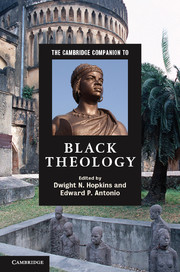Book contents
- Frontmatter
- Part I Introduction
- Part II Themes in black theology
- Part III Global expressions of black theology
- 16 The history of black theology in South Africa
- 17 Black theology in Britain
- 18 Slave religion and black theology in Brazil
- 19 Black theology in Cuba
- 20 Black theology in Jamaica
- 21 Methodology in an Aboriginal theology
- 22 Black theology and postcolonial discourse
- 23 The future of black theology
- Further reading
- Index
- Other titles in the series
19 - Black theology in Cuba
from Part III - Global expressions of black theology
Published online by Cambridge University Press: 28 September 2012
- Frontmatter
- Part I Introduction
- Part II Themes in black theology
- Part III Global expressions of black theology
- 16 The history of black theology in South Africa
- 17 Black theology in Britain
- 18 Slave religion and black theology in Brazil
- 19 Black theology in Cuba
- 20 Black theology in Jamaica
- 21 Methodology in an Aboriginal theology
- 22 Black theology and postcolonial discourse
- 23 The future of black theology
- Further reading
- Index
- Other titles in the series
Summary
The missionary work of white North American Protestants lacked understanding of the African presence in Cuba, especially in a nation with such profound roots. Everything in Cuba (the sense of national identity, the essence and expressions of Cuban culture, its revolutionary thought, its struggle for the abolition of bondage, for independence, liberation, and national sovereignty) is influenced by the considerable presence of male and female Africans who arrived in a colonized land into which they were brought as slaves. United States Protestant Southern mission boards arose in the 1880s, and for the next decade, and until 1898, they contributed financial aid, advice, and, in some sense, even respect for the Cubaness that the first church founders infused into the incipient Protestantism on the island.
Evangelical and Protestant work in Cuba at the end of the nineteenth and the beginning of the twentieth centuries began with the labor of patriot pastors. This period was characterized by the participation of the Protestant religious movement in the struggle for the country's independence and its social progress, among other things. These individuals were able to combine the Gospel and their passion for independence from a foreign yoke without any contradiction. In responding to an authentic identity and compromise, the people called their congregations “churches of the Cubans,” whereas a process of disillusionment had led to the Catholic churches being characterized as the “churches of the Spaniards.” These churches grew and developed a leadership with a deep Christian sense and a strong patriotism.
- Type
- Chapter
- Information
- The Cambridge Companion to Black Theology , pp. 256 - 266Publisher: Cambridge University PressPrint publication year: 2012

